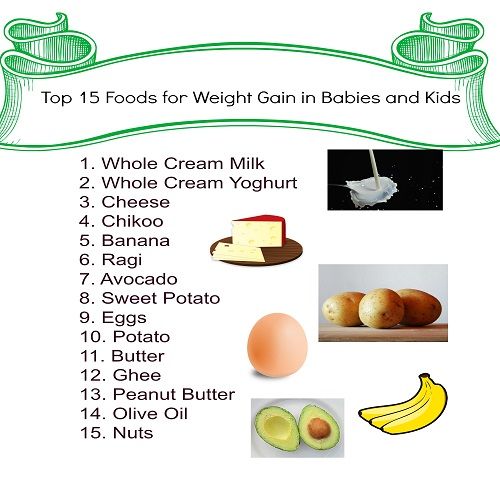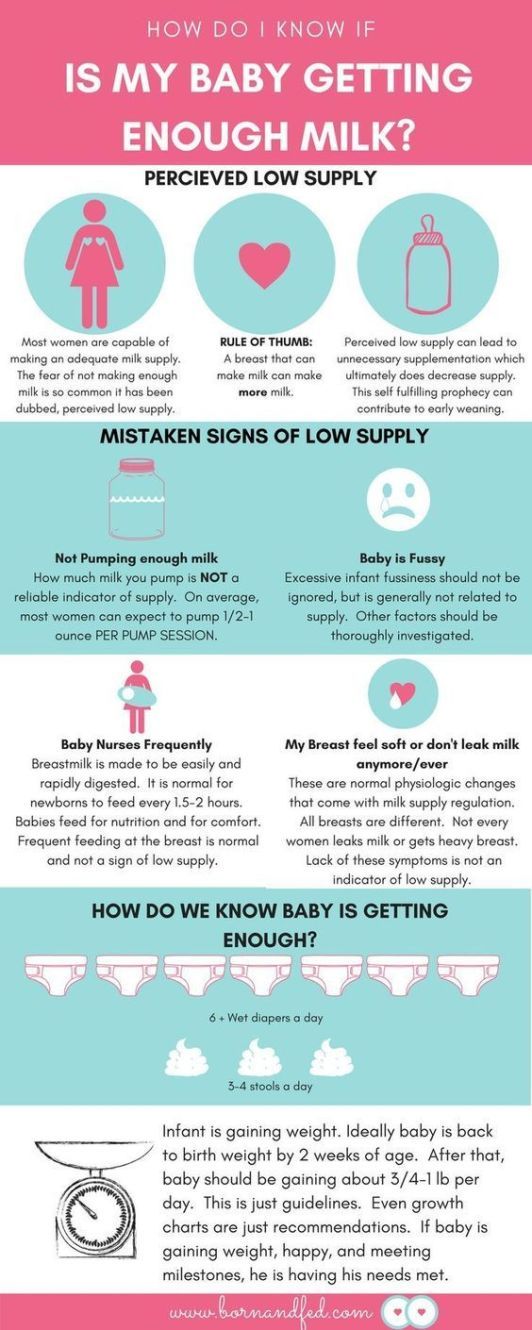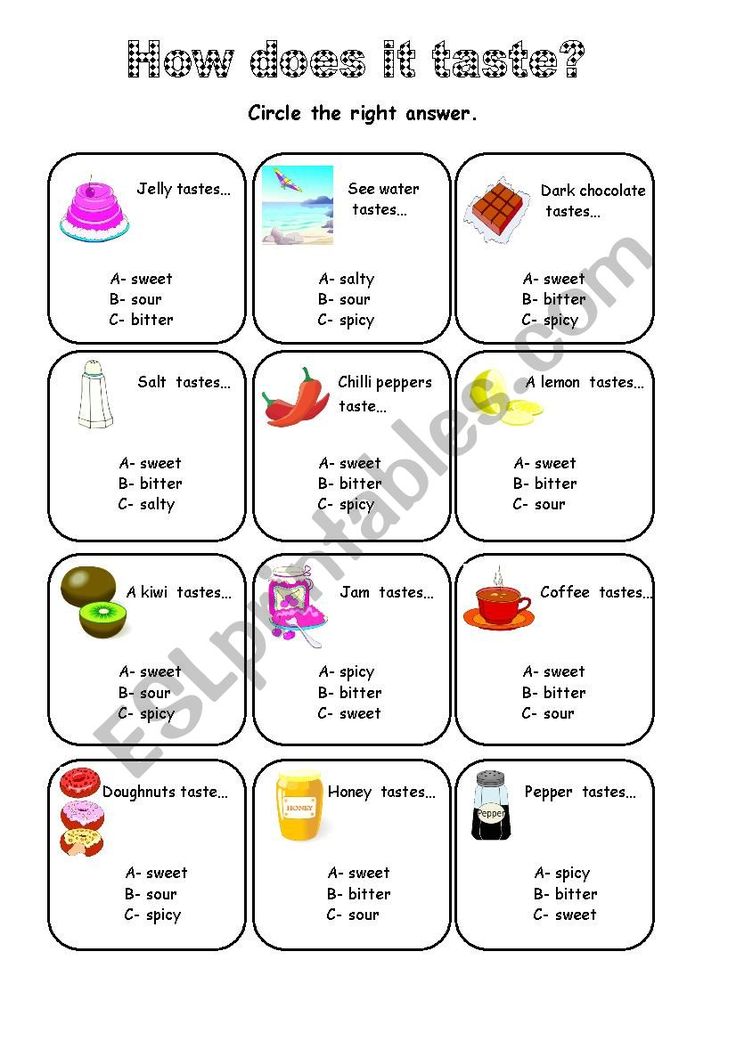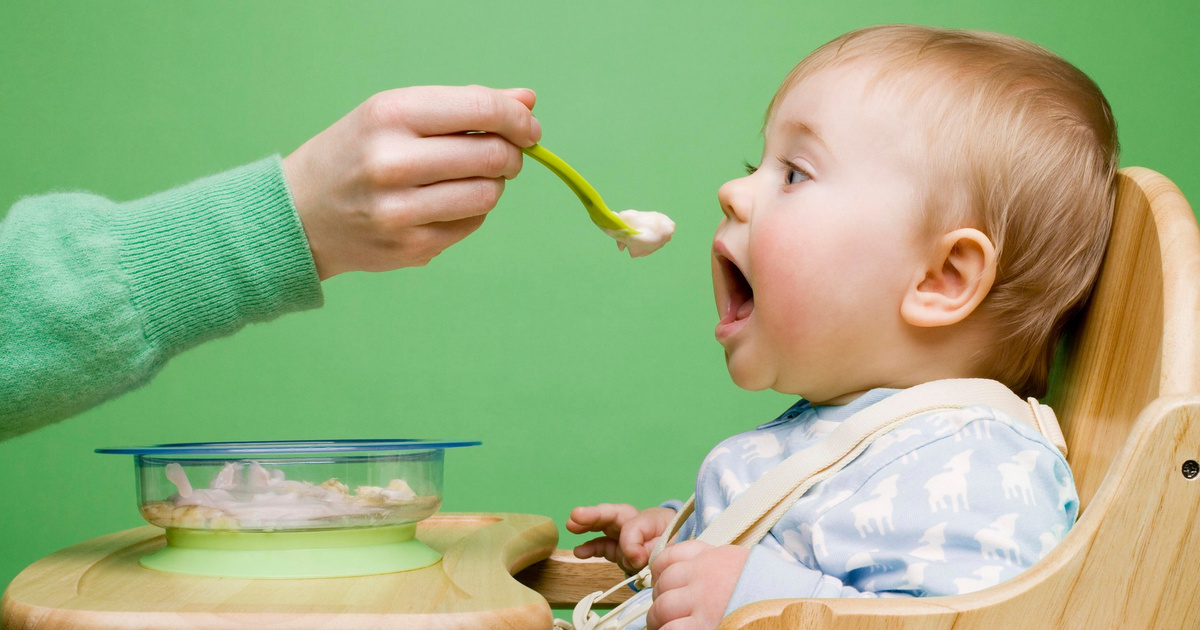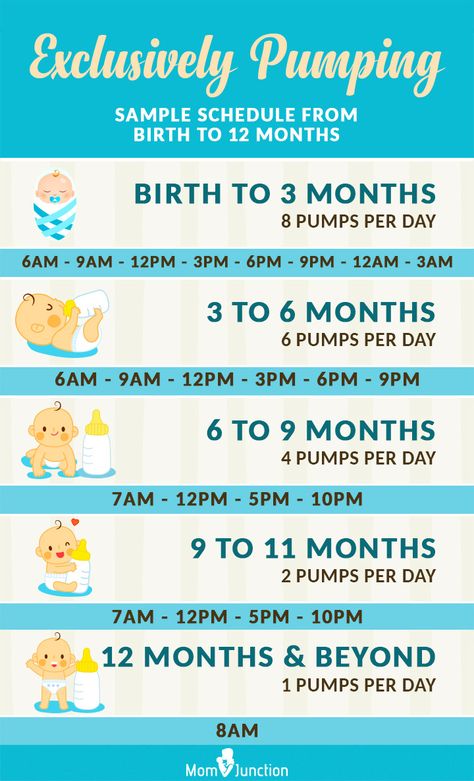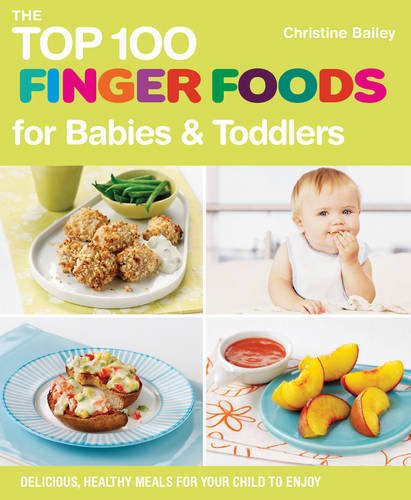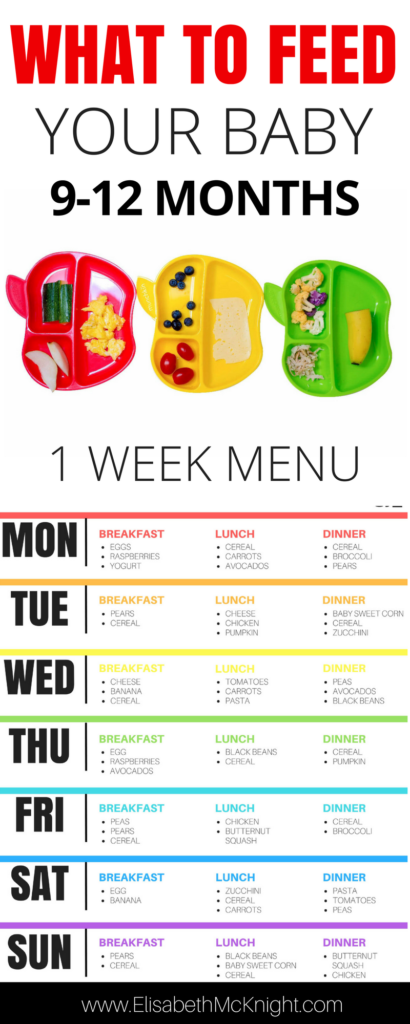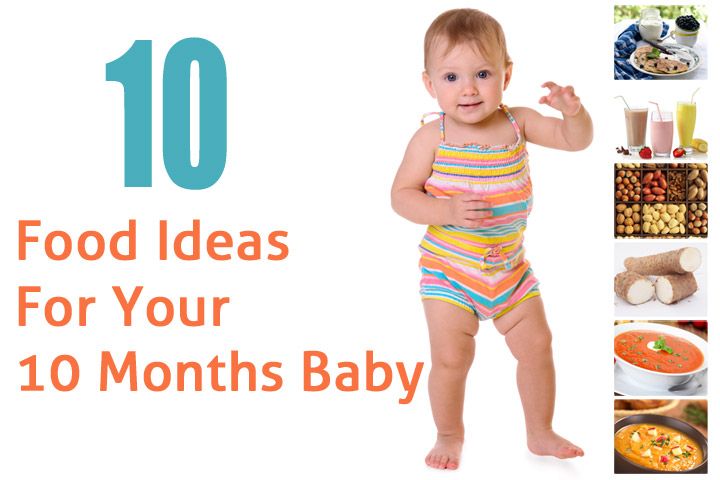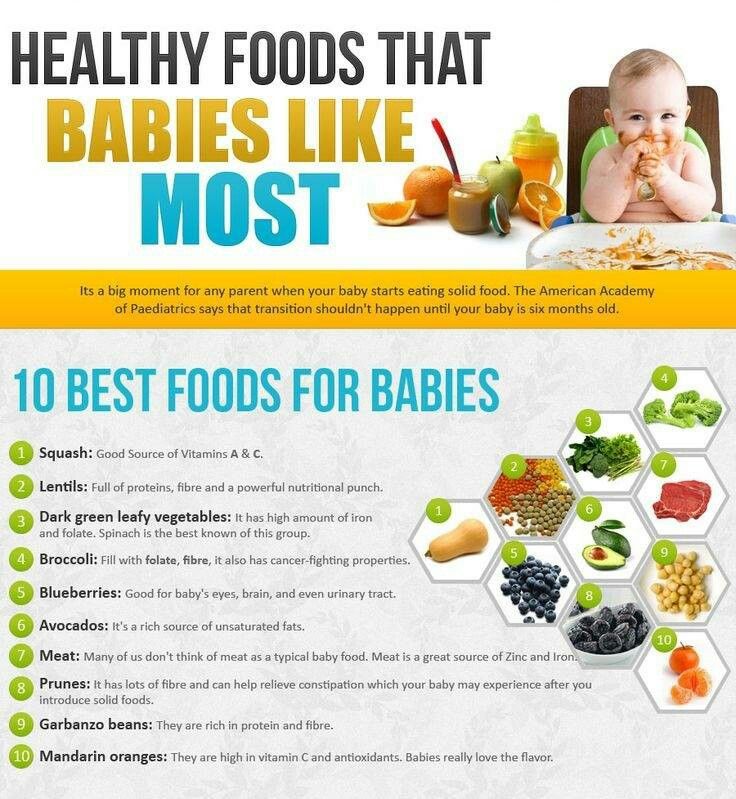What foods cause reflux in babies
Acid Reflux in Infants: Causes
Immature lower esophageal sphincter
The lower esophageal sphincter (LES) is a ring of muscle at the bottom of baby’s esophagus that opens to allow food into the stomach and closes to keep it there.
This muscle may not be fully matured in your baby, especially if they’re premature. When the LES opens, the contents of the stomach can flow back into the esophagus, causing baby to spit up or vomit. As you can imagine, it can cause discomfort.
This is very common and does not usually cause other symptoms. However, constant regurgitation from acid reflux can sometimes cause damage to the esophageal lining. This is much less common.
If spitting up is accompanied by other symptoms, it may then be called gastroesophageal reflux disease, or GERD.
Short or narrow esophagus
Refluxed stomach contents have a shorter distance to travel if the esophagus is shorter than normal. And if the esophagus is narrower than normal, the lining might more easily become irritated.
Diet
Changing the foods baby eats may help reduce the chances of acid reflux. And if you breastfeed, making changes to your diet might help your baby.
Some studies have shown that reducing intake of milk and eggs may help, though more research is needed to determine how much this affects the condition.
Certain foods may be causing acid reflux, depending on your infant’s age. For example, citrus fruits and tomato products increase acid production in the stomach.
Foods like chocolate, peppermint, and high fat foods can keep the LES open longer, causing the contents of the stomach to reflux.
Gastroparesis (delayed emptying of the stomach)
Gastroparesis is a disorder that causes the stomach to take longer to empty.
The stomach normally contracts to move food down into the small intestine for digestion. However, stomach muscles don’t work properly if there is damage to the vagus nerve because this nerve controls the movement of food from the stomach through the digestive tract.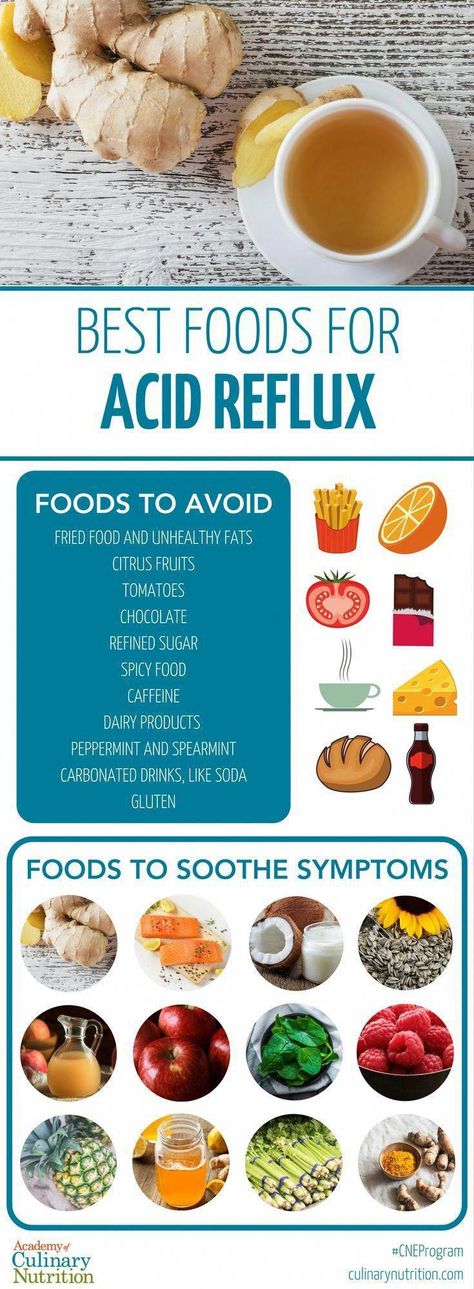
In gastroparesis, the stomach contents remain in the stomach longer than they’re supposed to, encouraging reflux. It’s rare in healthy infants.
Hiatal hernia
A hiatal hernia is a condition in which part of the stomach sticks through an opening in the diaphragm. A small hiatal hernia doesn’t cause problems, but a larger one can cause acid reflux and heartburn.
Hiatal hernias are very common, especially in people over the age of 50, but they are rare in infants. However, the causes are unknown.
A hiatal hernia in children is usually congenital (present at birth) and may cause gastric acid to reflux from the stomach into the esophagus.
Position while feeding
Positioning — especially during and after feeding — is a frequently overlooked cause of acid reflux in infants.
A horizontal position makes it easier for the stomach contents to reflux into the esophagus. Simply keeping baby in an upright position while you’re feeding them and for 20 to 30 minutes afterward may reduce acid reflux.
Sleep positioners and wedges, however, are not recommended while feeding or sleeping. These padded risers are intended to keep your baby’s head and body in one position, but are not recommended by the Food and Drug Administration due to the risk of sudden infant death syndrome (SIDS)
Angle of His
The angle at which the base of the esophagus joins the stomach is known as the “angle of His.” Differences in this angle may contribute to acid reflux.
This angle most likely affects the ability of the LES to keep the contents of the stomach from refluxing. If the angle is too sharp or too steep, it may make it difficult to keep the stomach contents down.
Overfeeding
Feeding your little one too much at once can cause acid reflux. Feeding your infant too frequently can also cause acid reflux. It’s more common for bottle-fed babies to overfeed than breastfed infants.
An oversupply of food can put too much pressure on the LES, which will cause your infant to spit up.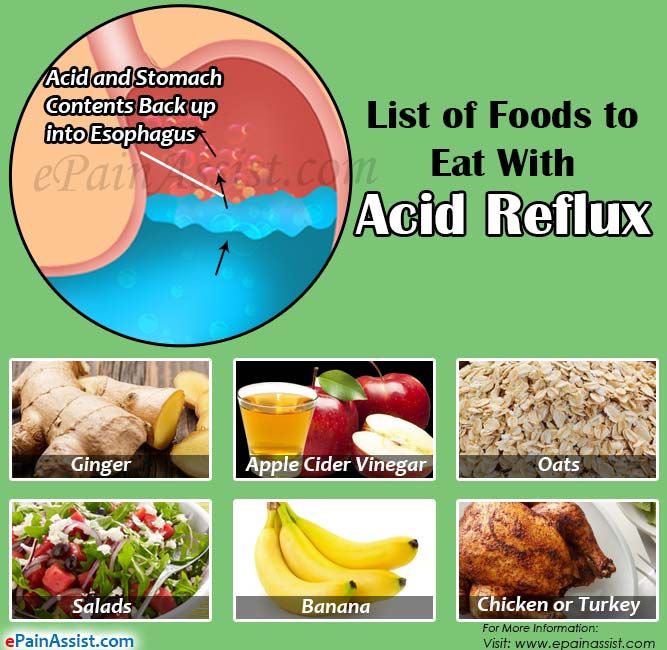 That unnecessary pressure is taken off the LES and reflux decreases when you feed baby less food more often.
That unnecessary pressure is taken off the LES and reflux decreases when you feed baby less food more often.
However, if your baby spits up often, but is otherwise happy and growing well, you may not need to change your feeding routine at all. Talk with your doctor if you have concerns that you are overfeeding your baby.
Your infant will usually grow out of acid reflux. However, call your child’s doctor immediately if you notice that your child:
- isn’t gaining weight
- has feeding difficulties
- is projectile vomiting
- has blood in their stool
- has pain signs such as arching of the back
- has unusual irritability
- has trouble sleeping
While it isn’t easy to determine the exact cause of acid reflux in infants, lifestyle and diet changes may help eliminate some of the factors.
If the acid reflux doesn’t go away with these changes and your baby has other symptoms, a doctor may want to perform tests to rule out a gastrointestinal disorder or other problems with the esophagus.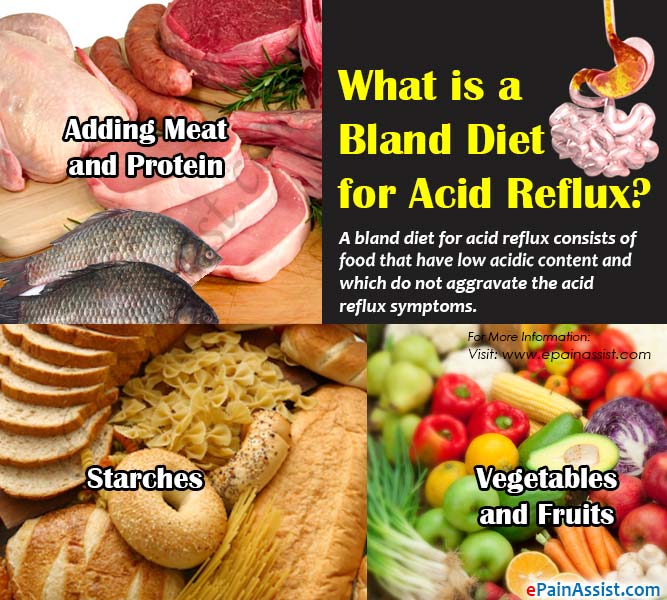
What Foods to Avoid When Breastfeeding Baby with Reflux
Sharing is caring!
- Share
Is your breastfed baby suffering from acid reflux? It can be so stressful to see your baby go through this, even though it is a common problem with newborns. If your baby is having acid reflux, there are lots of things you can do to improve their condition such as changing feeding position, burping after feeding and being aware of food to avoid when breastfeeding.
Acid reflux usually happens when the acid in the stomach moves back into the esophagus or the food pipe, resulting in the irritation of the lining of the food pipe and heartburn. But many new moms do not realize that if you are nursing it can also be a problem for your baby. The good thing is it is not as dangerous as it sounds.
If your baby has reflux after nursing, you may need to consider eliminating the food or drink that you consumed within a few hours or so before nursing.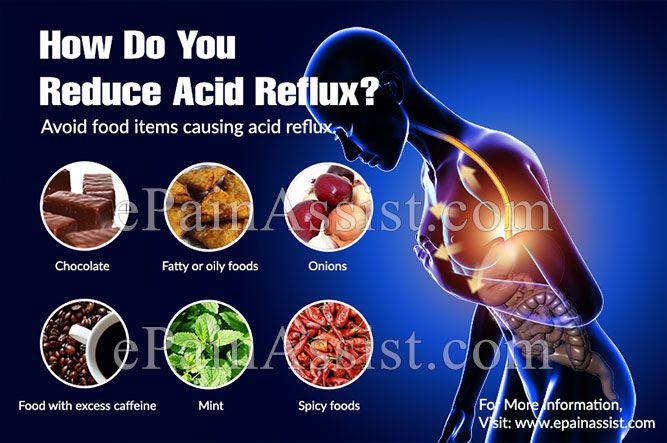
Keeping a food journal of everything you eat and drink with the date and time you consumed it can be very helpful for pin pointing the foods that may be triggering your newborn’s reflux.
Remember what you eat or drink, will affect your baby. So, a well-balanced breastfeeding diet is important for your health as well as your baby’s health.
In most cases, there is no need to medicate your baby for reflux. Diet changes will provide great results for your baby and you. After all, it is very disturbing to see your baby in distress. By removing acid foods, foods that trigger reflux, and overeating you will see the desired results quickly.
Make sure to pin this post for later!
{Disclosure: This post contains affiliate or referral links. Read more about that here.}
List of Foods to Eliminate to help control your baby’s reflux
There are some foods that commonly can cause acid reflux for breastfed babies.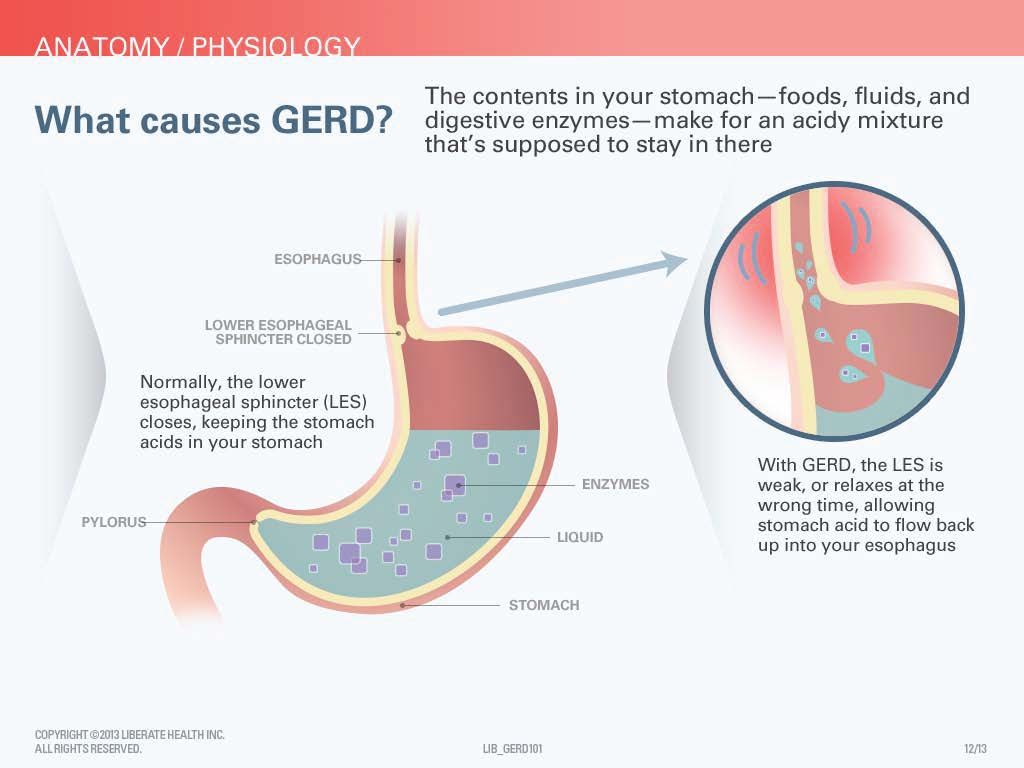 It can be hard to “give up” some of these foods so it’s important to focus on what you can eat while breastfeeding, just as much as the foods to avoid.
It can be hard to “give up” some of these foods so it’s important to focus on what you can eat while breastfeeding, just as much as the foods to avoid.
While many of these foods are good for you normally, while breastfeeding it can be helpful to eliminate these foods to aid in relieving your baby’s acid reflux.
The advice included in this article is meant for informational purposes only. Please consult your care provider before making any decisions regarding your pregnancy.
Tomatoes
Tomatoes contain citric acid, malic acid and trace amounts of oxalic acid. People who have acid reflux triggered by these acids may well have acid reflux from eating tomatoes, their by-products, such as pizza or ketchup, or drinking tomato juice. That’s a lot of acid!
Tomatoes may not cause you to have reflux, but it may be the culprit that is causing your baby to spit up after nursing.
Coffee, Tea, and Carbonated Beverages
These drinks are all caffeinated and should be avoided while nursing a baby that has reflux. They also contain different amounts of acid which may cause you distress to your baby’s tummy. They may be high in sugar as well.
They also contain different amounts of acid which may cause you distress to your baby’s tummy. They may be high in sugar as well.
Alcohol
Beer, wine, and liquor can relax the lower esophageal sphincter. Alcohol also stimulates the production of stomach acid. Many alcoholic beverages can be high in sugar as well. It’s best to avoid alcohol while nursing if you baby has acid reflux.
Citrus Fruits
Citrus fruits such as oranges, lemons, limes, and grapefruits contain more acid than other fruits that may lead to reflux. They also relax the lower esophageal sphincter. Enjoy other fruits while nursing.
High Fat Dairy
Try to substitute high fat milk, cheese, yogurt, and other dairy products for low fat options. Try coconut, oat, cashew or almond milk if cow milk is not tolerable for your nursing baby.
Read What to Eat While Breastfeeding for ideas of what to eat instead of dairy.
Mint
There is a big debate about mints such as peppermint and spearmint products.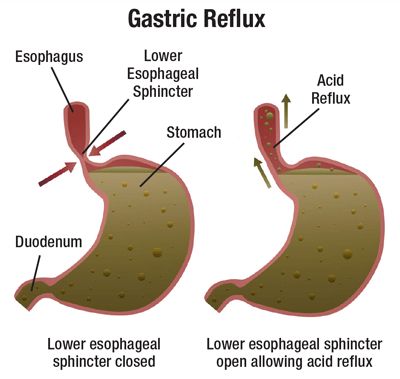 In some people it seems to cause heartburn and acid reflux. So, to be on the safe side, do not chew mint gum or eat mint foods while nursing.
In some people it seems to cause heartburn and acid reflux. So, to be on the safe side, do not chew mint gum or eat mint foods while nursing.
Peppermint is known to be among the herbs that decreases milk supply also.
Spicy Foods
Spicy foods are a part of everyday life for most people. But eating spicy foods such as chili and peppers may cause reflux for your nursing baby.
Consider eliminating spicy foods while nursing and see if it helps your baby’s reflux.
High Fat Foods and Fried Foods
Foods high in fat such as fried chicken, milkshakes, sauces, cakes, and other rich foods should be avoided when nursing. These foods worsen acid reflux and can cause weight gain because of high in calories.
Check out 5 ways to lose the postpartum belly here.
Red Meat
Red meat is high in acid and fat content that can cause reflux. Do you need to totally avoid red meat? No! Just consider substituting fatty cuts for leaner cuts of meat while you are breastfeeding your baby with reflux.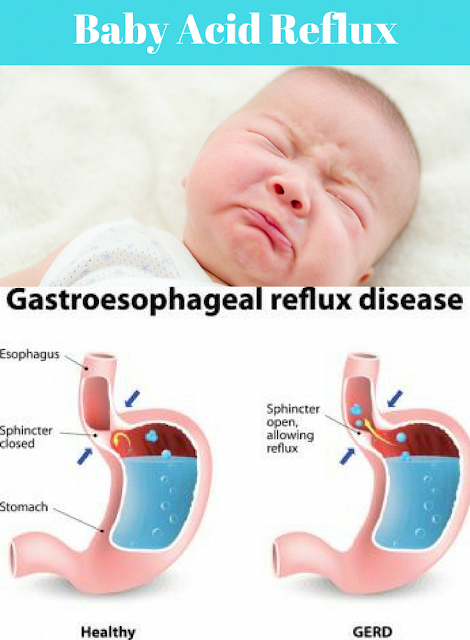
Processed Grain and Flour
Most of these foods are classified “junk food”. Some included are breads, hamburgers, cakes, cookies, and there are many more. Avoid these foods, they may cause reflux or gas for your nursing baby.
Look into making your own healthy breastfeeding snacks like these.
Garlic and Onions
Garlic and onions are known to cause heartburn or acid reflux in some people. Your baby may be one those people. So be careful consuming these when you are breastfeeding and test out eliminating this food if your newborn’s acid reflux persists.
Cruciferous Vegetable
Vegetables like broccoli, cauliflower and cabbage may cause gas in many breastfed babies which can lead to reflux for your baby. You may want to eliminate these as well if they effect your nursing baby.
Chocolate
Chocolates contain cocoa and theobromine, which are known to increase the acidity in the stomach. This is a hard one to give up, but you may have to forgo chocolate bars, hot chocolate, chocolate milk, and other chocolate products until after nursing if your baby is suffering from reflux.
Don’t worry, this time of having to watch what you eat does not last long. Generally by 6 months most babies out grow their digestive sensitivities to food you eat while breastfeeding and you can go back to a normal diet.
It is always best to consult your baby’s pediatrician if reflex continues. But changing your diet, controlling your weight, avoiding irritating foods, and generally taking care of yourself will in turn, keep your breastfeed baby healthy too.
More Breastfeeding Resources
Here at Birth Eat Love our goal is to make healthy eating easier for busy Moms during postpartum and breastfeeding.
Homemade breastfeeding snack recipes – this ebook has some great recipes that are low in sugar and dairy free for boosting milk supply.
Wondering what foods you can eat that will help increase your milk supply? This post has 11 real foods that you can eat today to make more milk and includes recipes, supplements and product suggestions.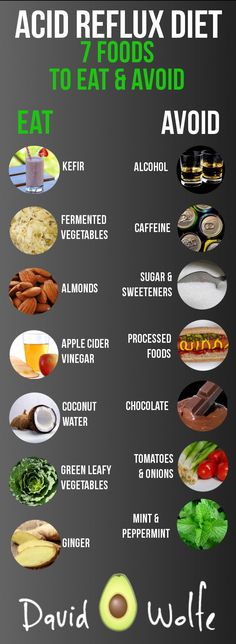
Do you have a colicky or super fussy breastfed baby? There are some foods you may be eating that could be making your baby uncomfortable. Read about a few foods to avoid while breastfeeding here.
Looking for breastfeeding recipes that can help support your milk production? Here are 9 breastfeeding soups that you can make in the slow cooker or instant pot.
Interested in making freezer meals so you can have easy dinners? Check out this freezer meal ebook that has 12 recipes specifically designed to support breastfeeding and postpartum recovery.
Tired of trying to decide what to eat while breastfeeding? Reduce the thinking and stressing about meal time with this simple breastfeeding meal plan.
Trying to find a way to cope with the summer heat? Look no further with These refreshing iced teas
Sharing is caring!
- Share
Proper nutrition for GERD - Clinic on Leninsky
The key to solving many problems with the gastrointestinal tract is proper nutrition. Gastroenterologist at the Clinic on Leninsky Katerina Chesskaya tells what you can and should eat for those who suffer from reflux disease.
Gastroenterologist at the Clinic on Leninsky Katerina Chesskaya tells what you can and should eat for those who suffer from reflux disease.
What is GERD?
Gastroesophageal reflux disease (GERD) is a chronic relapsing disease in which there is a spontaneous, regularly repeated reflux of stomach contents into the esophagus. As a result, the lower esophagus is affected. The reflux of stomach contents into the esophagus is considered normal if it occurs occasionally and is not accompanied by negative factors. The disease is evidenced by the frequent recurrence of casting and inflammatory processes of the gastrointestinal tract. nine0005
GERD is usually manifested by belching and heartburn after eating or bending forward, and also at night. Another indication of the presence of GERD is pain behind the sternum, extending to the interscapular region, lower jaw, and the left half of the chest. There are also signs of GERD that are not directly related to the esophagus - a cough, shortness of breath, often occurring when lying down, hoarseness, dry throat, rapid satiety, and bloating.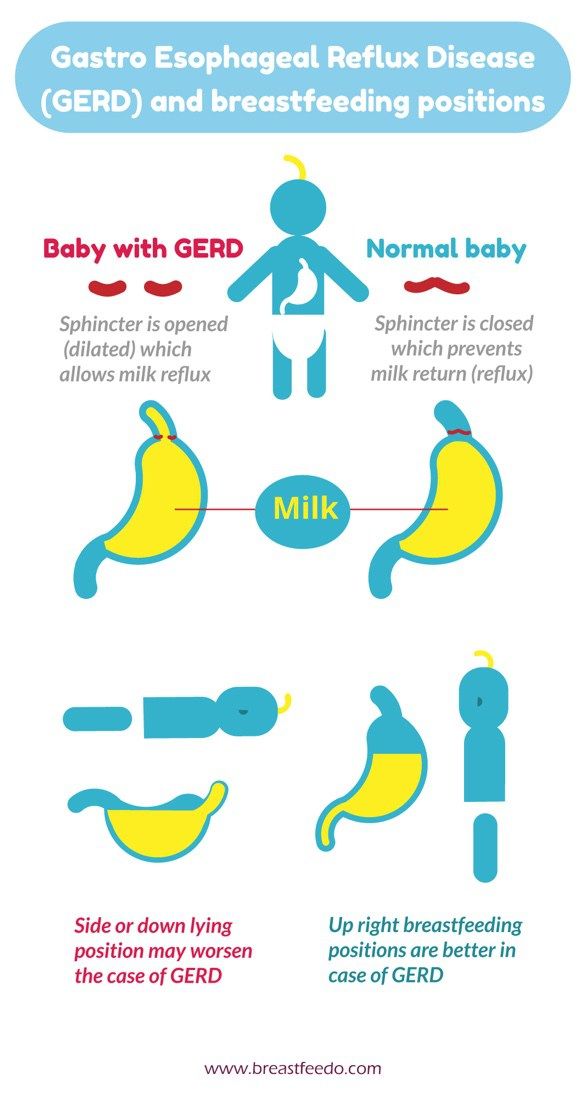 The cause of chronic inflammatory diseases of the nasopharynx (pharyngitis, laryngitis, sinusitis, tonsillitis) in 30% of cases is GERD. It has been proven that against the background of GERD there is a risk of developing obstructive pulmonary diseases, including bronchial asthma. nine0005
The cause of chronic inflammatory diseases of the nasopharynx (pharyngitis, laryngitis, sinusitis, tonsillitis) in 30% of cases is GERD. It has been proven that against the background of GERD there is a risk of developing obstructive pulmonary diseases, including bronchial asthma. nine0005
Proper nutrition for GERD
As in the case of many other diseases of the gastrointestinal tract, the main principle of the treatment of GERD is proper nutrition. There are foods that relax the lower esophageal sphincter, which leads to the reflux of acidic stomach contents into the esophagus, that is, reflux. These include; strong tea, coffee, chocolate, citrus fruits, tomatoes, bitters (garlic, onion), fresh mint. As well as fatty varieties of fish, meat and products that cause gas formation: muffins, hot pastries, legumes, brown bread, cakes, pastries, grapes, cucumbers, carbonated drinks. Alcohol and smoking also reduce the tone of the lower esophageal sphincter. nine0005
Here is a list of foods to consider when planning your menu for the day.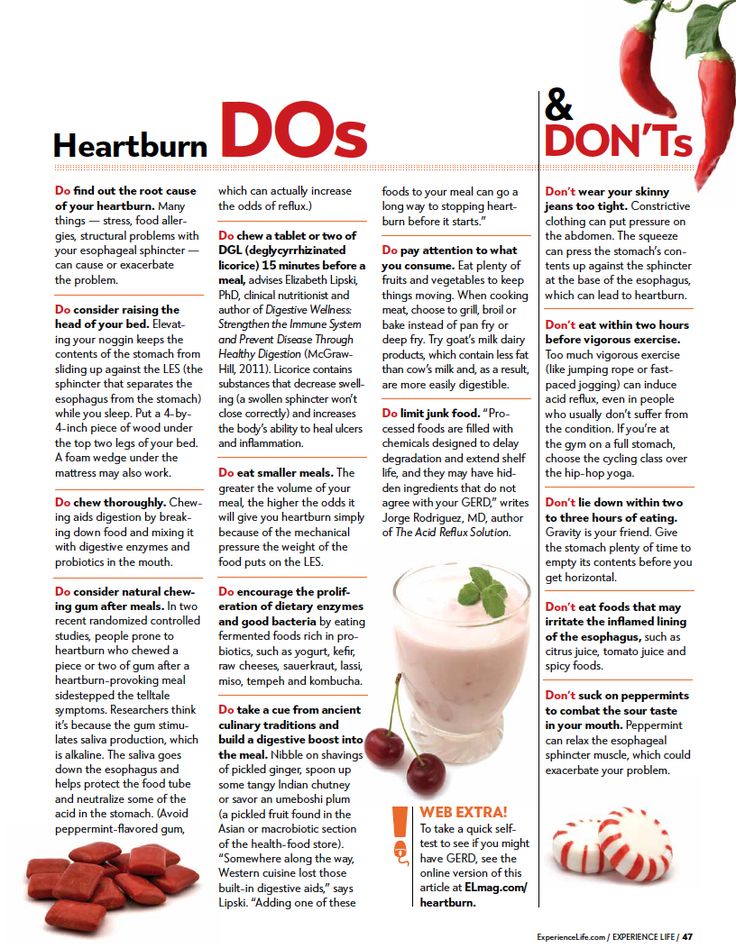
Delete:
1. Bread: fresh rye bread, tarts and pancakes.
2. Meat: stewed and fried meat dishes from fatty meat, poultry.
3. Fish: fatty fish, fried, smoked, salty dishes.
4. Vegetables: white cabbage, turnip, rutabaga, radish, sorrel, spinach, onion, cucumbers, salted, pickled and pickled vegetables, mushrooms.
5. Fruit: Raw, sour, unripe fruit, dried fruit puree. nine0021 6. Cereals: millet, pearl barley, barley and corn grits, legumes.
7. High acidity dairy products, spicy and salty cheeses.
8. Sweet: halva, chocolate, ice cream, cakes.
9. Drinks: sour, carbonated, fruit drinks, strong tea, coffee and alcohol.
Recommended:
1. Bread: from wheat flour of the first or highest grade, yesterday, dry, uncomfortable baking.
2. Meat: Beef, veal, chicken, rabbit, turkey, all in the form of cutlets, meatballs, soufflés, mashed potatoes and quenelles. nine0021 3. Fish: boiled river fish - zander, pike, perch, any low-fat varieties.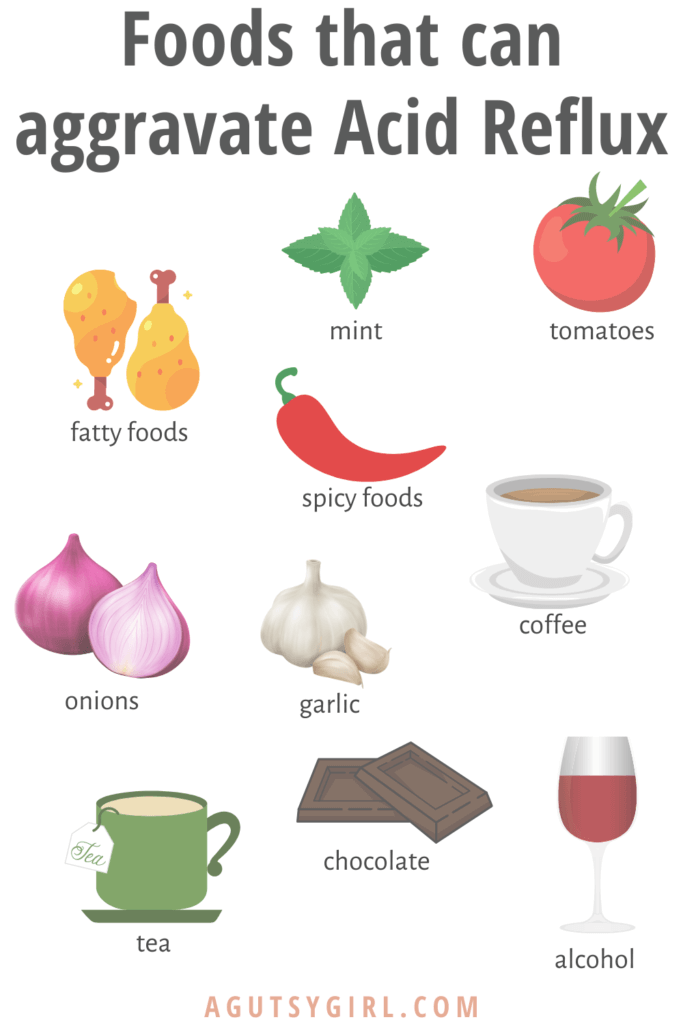
4. Vegetables: carrots, cauliflower, potatoes, beets, squash and squash.
5. Fruits: Sweet berries, ripe fruits. Preferably mashed or baked.
6. Cereals: oatmeal, semolina, buckwheat (mashed), rice porridge, on the water with the addition of milk, boiled vermicelli.
7. Dairy products: milk, lean cheese and low-fat sour cream. Cottage cheese dishes made from pureed cottage cheese, for example, cheesecakes, casseroles. nine0021 8. Sweet: jam, marshmallows, honey, marshmallow, cream and milk puddings.
9. Drinks: weak tea or cocoa with milk, sweet juices and decoctions.
It is also important to adhere to the diet:
— Fractional meals in small amounts and often up to 5-6 times a day.
- Do not lie down immediately after eating, the last meal is 2-3 hours before bedtime.
- Do not work in a slope, exclude the "gardener" pose.
- Do not wear tight belts and limit abdominal exercise. nine0021 - Obese people need to normalize body weight.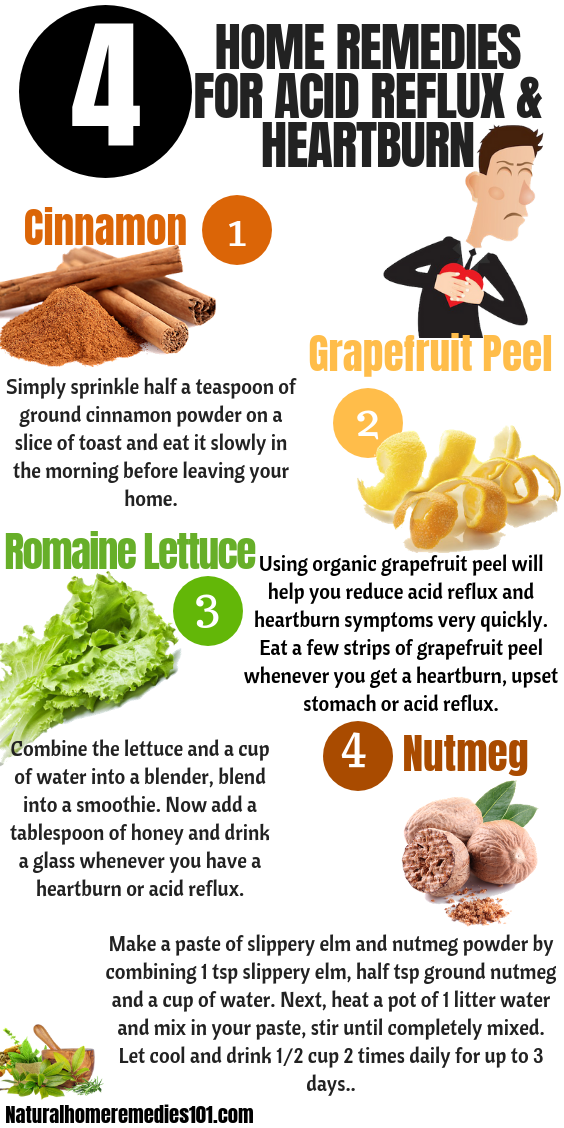
Remember that only a gastroenterologist can make a diagnosis of GERD (however, like any disease), to accurately determine the patient's condition. At the appointment, the doctor, together with the patient, will find the cause of the disease, outline a treatment plan and further supportive therapy in order to avoid relapses.
At the Clinic on Leninsky, an appointment is being made:
- pediatric gastroenterologist Natalya Medvedeva;
- gastroenterologist Ekaterina Chesskaya. nine0064
You can make an appointment with a gastroenterologist at the Clinic on Leninsky
by calling +7 (495) 668-09-86 .
Moscow, Leninsky prospect, building 67, building 2
Tel. .-Fri. 7:30–20:00 Sat-Sun 9:00–18:00
When a person swallows food, it passes through the esophagus into the stomach.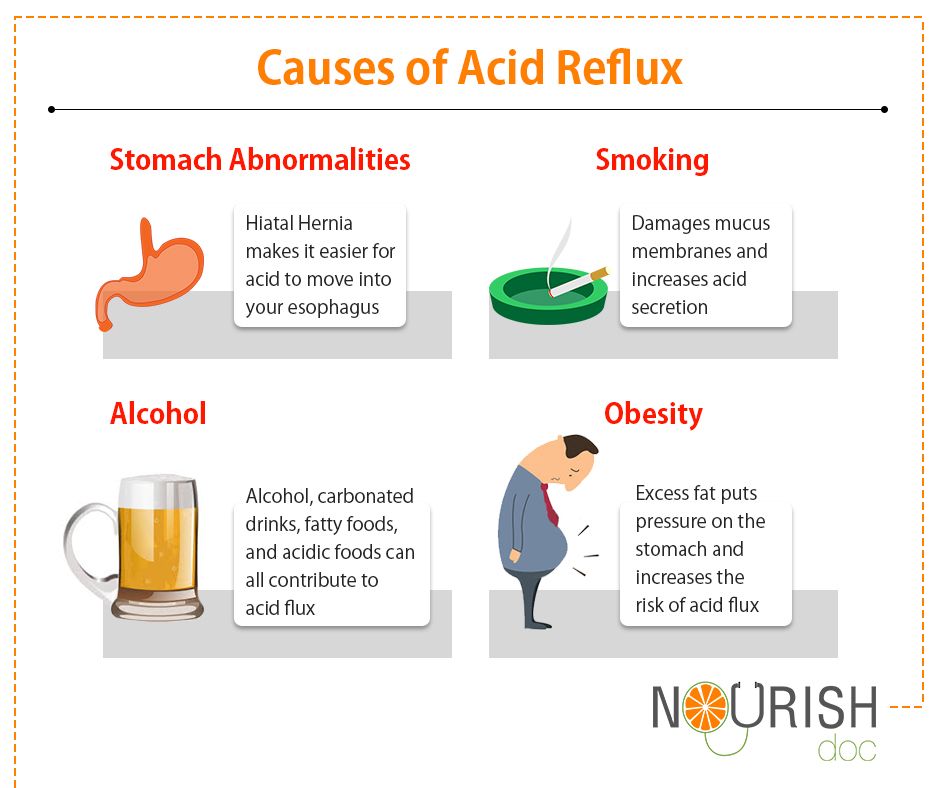 At the same time, the sphincter in the stomach prevents food from being thrown back into the esophagus. However, if this sphincter malfunctions, the contents of the stomach can again enter the esophagus, which causes heartburn. If such a symptom appears more than 2 times a week for 3 weeks, it can be argued that a chronic form of gastroesophageal reflux disease (GERD) has developed. If this condition is not treated, it can lead to the development of cancer at the site of damage to the lining of the digestive tract. Many individuals with GERD are familiar with heartburn and nausea after eating. However, other common symptoms of GERD are also considered: hiccups, belching, wheezing or weak cough, sore throat, voice change, hoarseness. nine0005
At the same time, the sphincter in the stomach prevents food from being thrown back into the esophagus. However, if this sphincter malfunctions, the contents of the stomach can again enter the esophagus, which causes heartburn. If such a symptom appears more than 2 times a week for 3 weeks, it can be argued that a chronic form of gastroesophageal reflux disease (GERD) has developed. If this condition is not treated, it can lead to the development of cancer at the site of damage to the lining of the digestive tract. Many individuals with GERD are familiar with heartburn and nausea after eating. However, other common symptoms of GERD are also considered: hiccups, belching, wheezing or weak cough, sore throat, voice change, hoarseness. nine0005
The unpleasant symptoms of GERD may be exacerbated if the person lies down immediately after eating. Some also note an increase in the severity of such signs during the night. Since GERD is a digestive disorder, a relationship can be traced between diet and the symptoms of this pathology. So, there are products that increase or, conversely, reduce the severity of these symptoms. The first include: meat, oils and foods high in fat, salt in large quantities, foods rich in calcium (milk, cheese). nine0005
So, there are products that increase or, conversely, reduce the severity of these symptoms. The first include: meat, oils and foods high in fat, salt in large quantities, foods rich in calcium (milk, cheese). nine0005
For example, a study published in Gut and Liver found an association between cow's milk allergy and GERD symptoms in children. Researchers have determined that children who are allergic to cow's milk are likely to experience symptoms of GERD when drinking this product. More research in this area is needed to confirm this association in adults, but scientists note that if a person experiences GERD symptoms regularly after consuming cow's milk products, he should eliminate them from the diet. nine0005
Another study published in Alimentary Pharmacology and Therapeutics found an association between eating high cholesterol foods and GERD symptoms. It showed that individuals who consumed more cholesterol, saturated fatty acids, and calories from fatty foods experienced more severe GERD symptoms than those who followed a healthy diet.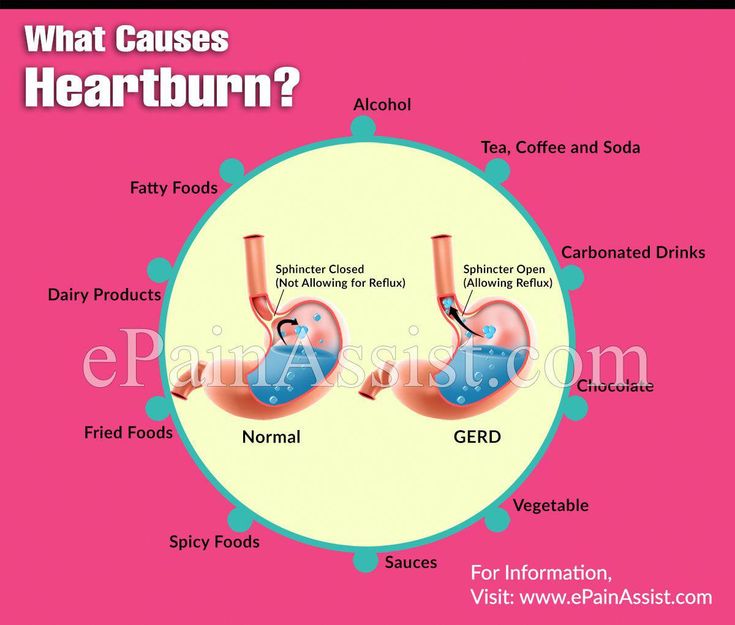
Among the foods that are also not recommended for GERD are chocolate, mint, carbonated drinks, fruit juices, coffee, foods with a high acid content, such as tomato sauce, etc.
A 2013 study of more than 500 volunteers found that certain foods can reduce the incidence of GERD symptoms. These include: foods high in protein (tuna, salmon, cashew nuts, almonds, lentils), some fruits (apples, melon, peach, citrus fruits) and vegetables (potatoes), as well as berries, eggs. Increasing fiber intake has also been associated with a reduction in GERD symptoms.
In addition to dietary changes, it is worth including foods rich in probiotics in the diet in the presence of GERD, since the normalization of the microflora of the gastrointestinal tract can help to cope with digestive disorders in general. In addition, probiotics help fight bacteria H . p ylori , which has been associated with GERD symptoms. Another way to reduce the severity of these symptoms is the use of a decoction of elm bark.


